On February 5th a report headlined “McDonald’s sales dented by Israel-Gaza boycotts” and tagged “Israel-Gaza war” was published on the BBC News website’s ‘Business’ and ‘Middle East’ pages.
Written by a business reporter named Sam Gruet, that report opens as follows: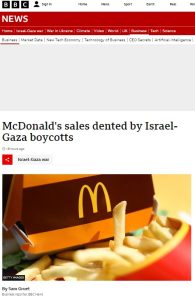
“McDonald’s has missed a key sales target, partly due to customers boycotting the firm for its perceived support of Israel.
The fast food chain reported its first quarterly sales miss in nearly four years due to weak growth in its international business division.”
Gruet later adds:
“McDonald’s relies on a franchise system in which thousands of independent businesses own and operate most of its more than 40,000 stores around the world. About 5% of its outlets are located in the Middle East.
The fast food retailer drew criticism after its Israel-based franchise said it had given away thousands of free meals to members of the Israeli military, sparking calls to boycott the brand by those angered by Israel’s military response in Gaza.
It prompted franchise owners in Muslim-majority countries such as Kuwait, Malaysia and Pakistan to put out statements distancing themselves from the firm.” [emphasis added]
Remarkably, not even one sentence in the whole of Gruet’s report explains what prompted “Israel’s military response in Gaza”. Readers are told nothing at all about the unprecedented invasion of Israel by a proscribed terrorist organisation, the thousands of rocket attacks, the brutal murders and rapes of Israeli civilians or the taking of hostages and the fact that 132 Israelis are still being held by terrorists in the Gaza Strip, their condition mostly unknown.
Gruet links to another report about McDonald’s – also tagged “Israel-Gaza war” – which had appeared the previous day on the BBC News website’s “Business” page under the headline “McDonald’s hit by Israel-Gaza ‘misinformation’”. That uncredited report also appears as related reading in Gruet’s article.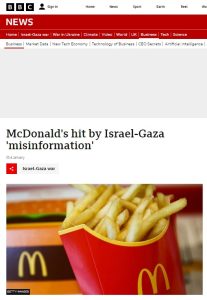
In that report readers find less than half a sentence giving a minimalist portrayal of the cause of the current war: [emphasis added]
“Since Hamas attacked Israel on 7 October, the McDonald’s corporate headquarters has tried to keep a low profile regarding the conflict.
But its brand has still been caught up in the fight.
In the weeks following the attack, McDonald’s Israel said it had given away thousands of free meals to members of the Israeli military.
The moves sparked grassroots calls for boycotts of the brand by those angered by Israel’s military response in Gaza, prompting owners in Muslim-majority countries such as Kuwait, Malaysia and Pakistan to put out statements distancing themselves.”
The unidentified writer of that report did, however, consider it appropriate – despite BBC editorial guidelines on “controversial content” in external links – to direct readers to a web page promoting the false and deliberately inflammatory “genocide” propaganda.
“The pro-Palestinian Boycott, Divestment and Sanctions (BDS), which had not formally targeted McDonald’s, this week officially called for a boycott of the brand.”
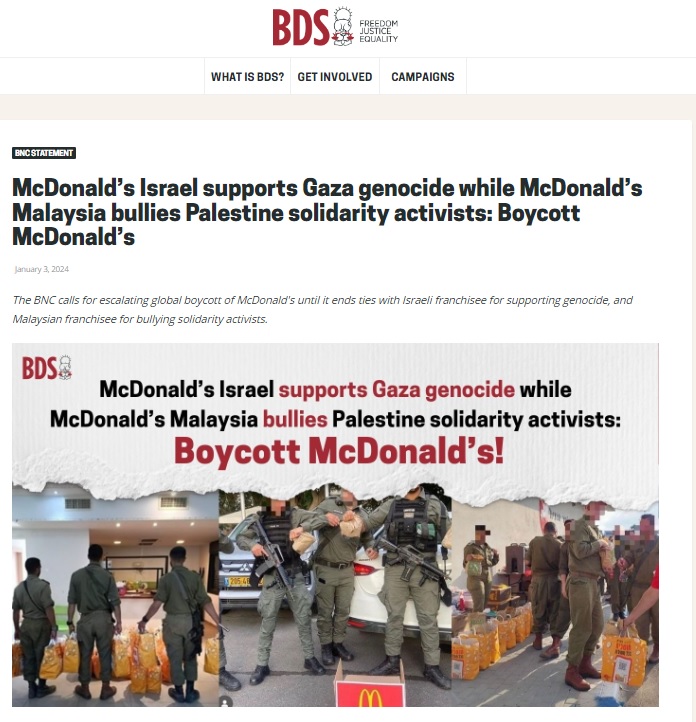
Moreover – and again, despite BBC editorial guidelines on the topic of “campaigns” and “social action” – that BBC report uncritically promotes a quote from the inadequately presented organisation that runs that website – PACBI:
“”Instead of pressuring its parent company, McDonald’s Corporation, to terminate its shameful franchise agreement in Israel, McDonald’s Malaysia and its Saudi owner are desperately trying to silence voices of peaceful solidarity with the Palestinian liberation struggle in Malaysia,” the group said.
“We cannot let this pass. Let’s show McDonald’s what grassroots boycotts can do.” [emphasis added]
As we all too often have cause to note on these pages, BBC editorial guidelines on impartiality include a section concerning ‘Contributors’ Affiliations’ which states:
“4.3.12 We should not automatically assume that contributors from other organisations (such as academics, journalists, researchers and representatives of charities and think-tanks) are unbiased. Appropriate information about their affiliations, funding and particular viewpoints should be made available to the audience, when relevant to the context.”
Readers of this BBC Business report should therefore have been informed of the fact that according to the ‘particular viewpoint’ of the quoted organisation PACBI (just like that of the Hamas terrorist organisation), “the Palestinian liberation struggle” negates the right to Jewish self-determination.
If BBC Business is going to report on the effects of boycott campaigns against McDonald’s and other companies, it should at least inform readers of the real agenda of those behind such campaigns. And if BBC Business is going to tag such reports “Israel-Gaza war”, it should not whitewash the brutal actions of the Hamas terrorist organisation that are the reason why that war began.
Related Articles:

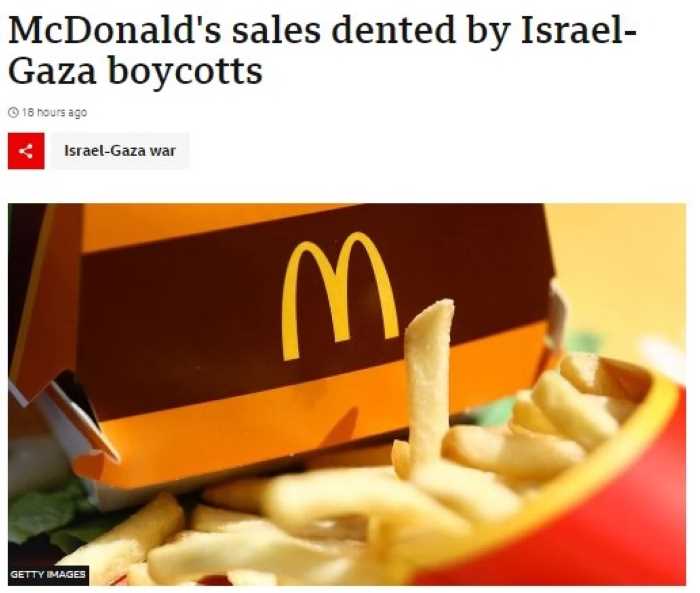

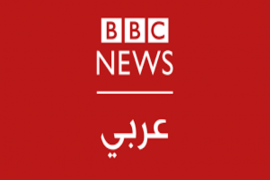
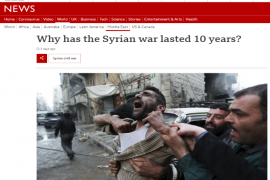

The BBC’s so-called “Reputation for Impartiality” does not exist. Its Muslim-infiltrated hierarchy has one purpose in its sights – the destruction of Israel by every possible means – including omissions, lies and false accusations – all at the behest of its patron – the Islamic Republic of Iran.